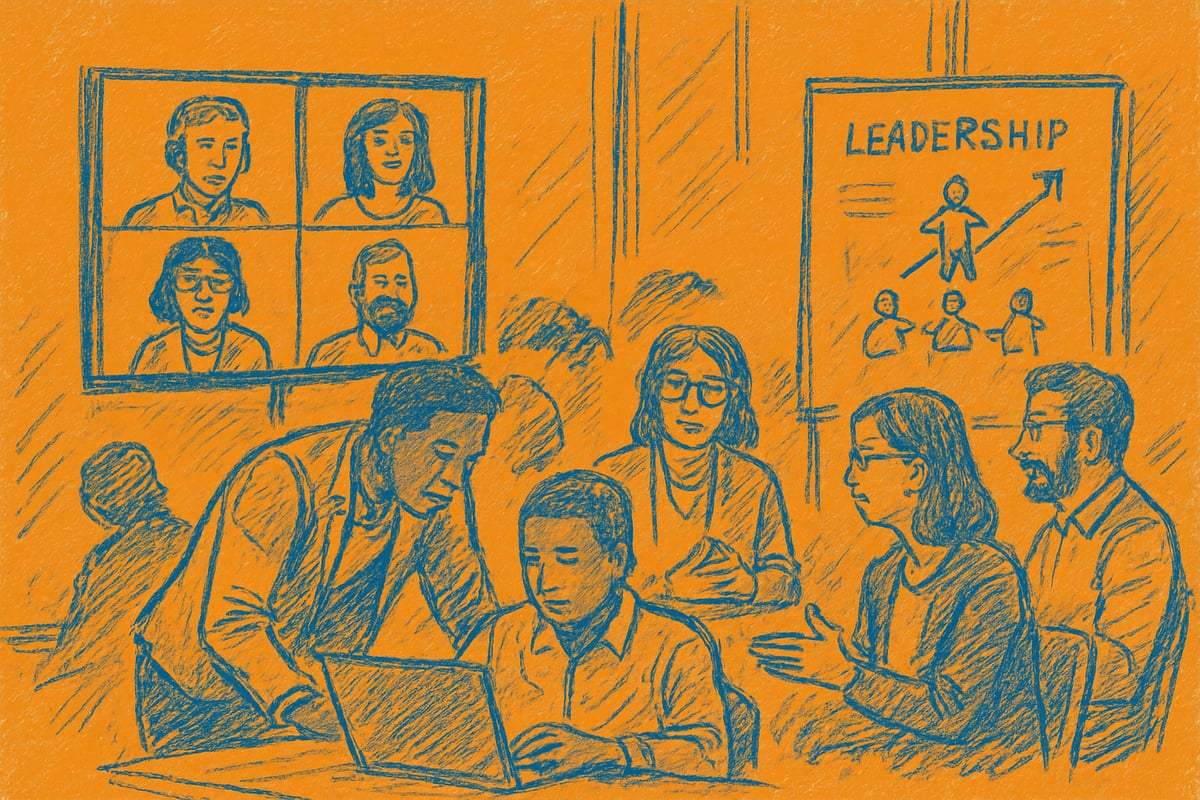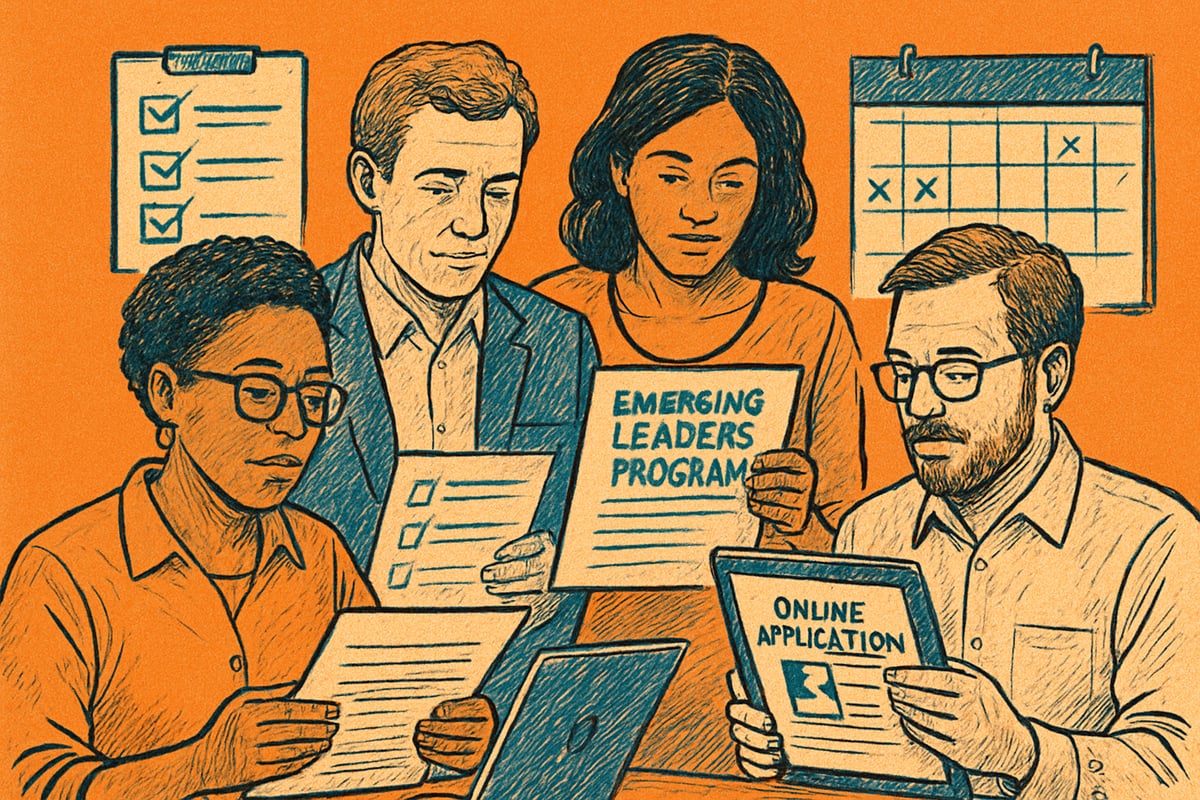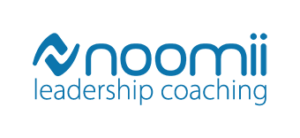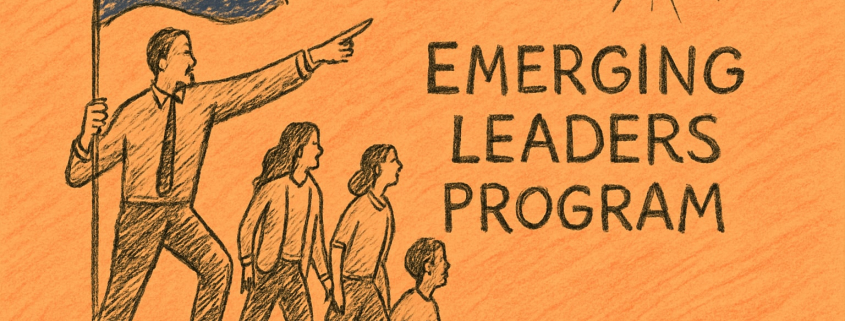Guide to the Emerging Leaders Program: Your 2025 Success Path
The need for agile, accountable leaders has never been greater as organizations navigate constant change. The emerging leaders program stands out as a proven path for those ready to meet tomorrow’s demands with confidence and vision.
This guide delivers a clear, actionable roadmap to the emerging leaders program—exploring its structure, unique benefits, curriculum, application process, and real participant experiences. By the end, you will know how this program can be your pivotal step toward leadership success in 2025.
Ready to advance your career? Discover how you can excel with the emerging leaders program, or take the next step by exploring Accountability Now.
Understanding the Emerging Leaders Program
The demand for adaptable, forward-thinking leaders has never been greater. The emerging leaders program is designed to bridge this gap, providing a structured path for professionals eager to drive change in higher education, government, and corporate environments. With a blend of real-world application and expert guidance, the program offers a transformative journey for those ready to step into impactful roles.

Program Purpose and Vision
The core mission of the emerging leaders program is to equip the next generation of leaders with the skills, mindset, and resilience needed to navigate complex challenges. Both AASCU and the Harvard Kennedy School have crafted their programs to foster effective, compassionate, and innovative leaders. This vision aligns with current trends emphasizing transformational change agents who can lead with empathy and strategic vision.
AASCU’s initiative is tailored for campus-wide leadership impact, focusing on actionable projects that benefit entire institutions. In contrast, Harvard’s program targets a global audience, developing cross-sector leaders who can influence policy and drive organizational change. Both institutions have a longstanding commitment to leadership excellence, offering immersive experiences that blend theory with practical impact. For a detailed look at AASCU’s approach, see the AASCU Emerging Leaders Program Overview.
Target Audience and Ideal Candidates
The emerging leaders program is designed for professionals ready to advance their leadership journey. Ideal candidates include:
- Mid-career professionals aiming for higher responsibility
- Aspiring administrators and managers in transition
- Early- to senior-career leaders seeking formal development
Participants come from a variety of sectors, such as:
- Higher education (department chairs, deans)
- Government agencies (managers, policy leads)
- Nonprofit organizations (directors, program leads)
- Corporate and military backgrounds
Eligibility requirements vary: Harvard prefers candidates with 5 to 15 years of experience, while AASCU requires a nomination or endorsement. This ensures cohorts are diverse, experienced, and ready to contribute meaningfully. Examples include university department heads, government managers, and nonprofit directors.
Key Differentiators and Outcomes
What sets the emerging leaders program apart are its hands-on learning opportunities and robust support networks. AASCU participants apply their learning through real-time campus projects, directly impacting their institutions. Harvard’s immersive simulations place participants in high-stakes scenarios, building skills in negotiation, crisis management, and coalition building.
Key features include:
- Access to seasoned faculty and mentors
- Strong peer networks for ongoing support
- Immediate application of new skills to real projects
Outcomes consistently include expanded professional networks, enhanced leadership skillsets, and readiness for senior roles. Over 350 AASCU institutions participate annually, and Harvard’s global cohort includes professionals from diverse sectors. Graduates report increased confidence, strategic insight, and measurable impact within their organizations.
Program Structure and Curriculum
Understanding the structure and curriculum of the emerging leaders program is crucial to determining how it can transform your leadership potential. Both AASCU and Harvard Kennedy School offer rigorous frameworks designed to challenge, inspire, and equip participants for leadership in today’s evolving landscape.

Format and Timeline
The emerging leaders program features a carefully balanced blend of learning formats to maximize engagement and real-world application. AASCU’s program runs from May to December 2025, combining virtual workshops, in-person intensives, and ongoing project work. Harvard’s program offers a week-long, on-campus immersion, with sessions scheduled for December 2025 or May 2026.
Attendance is mandatory for all components, reflecting the program’s commitment to participation and accountability. Participants must dedicate time for live sessions, project collaboration, and independent study. This immersive approach ensures that learning is continuous and actionable throughout the duration of the emerging leaders program.
Here is a quick comparison of the formats:
| Program | Format | Timeline | Commitment |
|---|---|---|---|
| AASCU | Virtual, in-person | May–December 2025 | Full participation |
| Harvard | On-campus, immersive | Dec 2025/May 2026 | 100% attendance |
Core Curriculum Topics
At the heart of the emerging leaders program is a dynamic curriculum tailored to the demands of modern leadership. Core modules for AASCU include leadership competencies, academic affairs, budgeting, enrollment management, project management, and change management.
Harvard’s curriculum covers negotiation, persuasion, coalition building, crisis management, ethics, and digital governance. Interactive elements are woven throughout, such as simulations, real-world case studies, group discussions, and experiential exercises. These methods foster practical skill development and deep engagement.
For a detailed look at Harvard’s curriculum and learning objectives, you can explore the Harvard Kennedy School Emerging Leaders Program.
Faculty and Mentorship
A signature strength of the emerging leaders program is the caliber of its faculty and mentors. AASCU’s team includes current and former university presidents, chancellors, and national leadership experts. Harvard’s program is led by renowned professors like Mathias Risse, along with distinguished guest lecturers from diverse sectors.
Mentorship is integral to participant growth. Faculty provide personalized guidance, helping participants navigate their campus or organizational projects. This mentorship fosters critical thinking, strategic planning, and confidence—qualities essential for senior leadership.
Participants benefit from direct access to thought leaders, ensuring that the emerging leaders program delivers both inspiration and practical wisdom for real-world challenges.
Participant-Led Projects and Application
Project-based learning is a cornerstone of the emerging leaders program. At AASCU, participants are required to lead a project within their home institution or organization, applying new skills in a tangible context. Common projects include chairing committees, spearheading strategic initiatives, or conducting research studies with measurable institutional impact.
Harvard’s program emphasizes collaborative simulations, challenging participants to solve real-world crises as a team. These projects demand creative problem-solving and the ability to implement change under pressure.
Such experiential learning ensures that graduates of the emerging leaders program can demonstrate immediate value to their organizations and advance their careers with confidence.
Networking and Peer Learning
The emerging leaders program thrives on a cohort-based model, fostering a supportive and confidential environment for peer-to-peer learning. Participants engage in small group discussions, share challenges, and build lasting professional relationships.
Networks formed during the program extend far beyond graduation. AASCU’s alumni span over 350 institutions, while Harvard’s global cohort includes leaders from higher education, government, corporate, nonprofit, and military sectors.
Peer learning enhances the experience, as participants gain diverse perspectives and expand their professional influence. The emerging leaders program’s network becomes a lifelong resource for collaboration, mentorship, and continued leadership development.
Application Process and Selection Criteria

Application Requirements
Applying to the emerging leaders program is a structured process, designed to identify high-potential candidates ready for advanced leadership roles. Both AASCU and Harvard expect a comprehensive application that demonstrates commitment, vision, and relevant experience.
Applicants are typically asked to provide:
- A completed application form with detailed personal and professional information
- A nomination or endorsement from a supervisor (required for AASCU)
- A clear statement of personal and professional goals
- A description of the proposed organizational or campus project
- An explicit commitment to full program participation
For Harvard, candidates should submit an online application, a current CV, a summary of their professional experience, and a motivation statement. To strengthen your application, consider utilizing resources like Develop your leadership skills, which can help you articulate your leadership journey and future aspirations.
Selection Process
The selection process for the emerging leaders program is highly competitive. Faculty panels from AASCU and Harvard review each application, prioritizing diversity, leadership potential, and alignment with program objectives.
Preference is often given to AASCU member institutions, while Harvard’s program welcomes a global applicant pool from higher education, government, nonprofit, corporate, and military sectors. Reviewers seek candidates who show initiative, a track record of impact, and readiness for increased responsibility.
The review process ensures that each cohort is composed of individuals who will contribute to and benefit from a collaborative, challenging learning environment. This careful selection helps maintain the standard of excellence expected from every emerging leaders program participant.
Program Fees and Scholarships
Understanding the financial investment is vital when considering the emerging leaders program. Costs vary by institution and membership status, with some financial assistance available.
| Program | Member Fee | Non-Member Fee | What’s Included | Scholarships/Financial Aid |
|---|---|---|---|---|
| AASCU | $2,500 | $3,500 | Tuition, materials, most meals | Limited scholarships for members |
| Harvard | $11,200–$11,300 | N/A | Tuition, materials, meals | Financial aid information provided |
Travel and accommodation expenses are not included. Prospective participants should review scholarship and financial aid options early, as these are limited and competitive for both the AASCU and Harvard emerging leaders program offerings.
Important Dates and Deadlines
Staying organized with key dates is essential for a successful application to the emerging leaders program. Each institution sets clear deadlines for application submission, registration, and participation.
- AASCU Application Deadline: March 31, 2025
- AASCU Program Dates: May to December 2025
- Harvard Application Deadlines: October 13, 2025, and March 16, 2026
- Harvard Session Dates: December 2025 or May 2026
Both programs enforce strict attendance and participation policies. Information on cancellation and deferral is provided upon acceptance, and early planning is encouraged to avoid missing these critical milestones.
Participant Experience and Success Stories
Embarking on the emerging leaders program is a transformative journey designed for professionals ready to expand their influence. The participant experience is carefully structured to foster growth, collaboration, and real-world impact. Each phase, from onboarding to alumni engagement, is tailored to maximize both personal and professional development.

Onboarding and Orientation
The journey begins with a comprehensive orientation that sets the tone for the entire emerging leaders program. Participants meet their cohort, establish shared goals, and build a strong sense of community.
AASCU’s in-person kickoff in Washington, D.C. is a signature experience, offering face-to-face networking and a deep dive into program expectations. This session ensures that everyone is aligned, motivated, and prepared to engage fully. Early connections formed during this phase often lead to lasting professional relationships, setting the stage for collaborative learning.
Day-to-Day Program Experience
Daily life in the emerging leaders program is dynamic and immersive. Participants engage in interactive workshops, group discussions, and targeted project work. The curriculum is intentionally varied, balancing leadership theory with hands-on exercises.
At Harvard, the intensive week includes lectures by renowned faculty, challenging simulations, and collaborative group assignments. For AASCU, ongoing virtual sessions and on-campus projects maintain momentum throughout the year. Each day offers opportunities to practice new skills, seek feedback, and reflect on progress, making the experience both rigorous and rewarding.
Real-World Impact and Case Studies
A defining element of the emerging leaders program is its focus on real-world application. Participants lead strategic initiatives, such as institutional research, committee chairing, or major change management projects within their organizations.
At Harvard, high-pressure simulations test crisis management and negotiation skills in real time. These experiences are not theoretical—they create measurable impact on campuses, agencies, and companies. Case studies from past cohorts demonstrate how these projects drive innovation, solve complex challenges, and contribute to organizational success.
Alumni Outcomes and Network
Graduates of the emerging leaders program frequently report significant career advancement, including promotions and expanded leadership roles. The alumni community is a powerful resource, providing ongoing support, mentorship, and networking opportunities.
Testimonials highlight the program’s ability to shape adaptable, forward-thinking leaders. For firsthand perspectives, explore leadership interview insights from those who have completed similar journeys. Continued engagement through alumni events and professional networks ensures that the impact of the program extends well beyond its conclusion.
Maximizing Your Success Path: Tips and Strategies
Preparing for and excelling in an emerging leaders program requires intentional effort at every stage. By following proven strategies, you can maximize your investment, accelerate leadership growth, and make a lasting impact in your organization and beyond.
Preparing a Standout Application
A compelling application is your entry point to the emerging leaders program. Start by clarifying your professional goals and how they align with the program’s mission. Articulate a project proposal that demonstrates both strategic thinking and institutional relevance.
Secure strong endorsements from respected leaders who can validate your potential. Reflect on your leadership journey and show how participation will bridge your current skills with future aspirations. Ensure your application is tailored, concise, and highlights measurable achievements.
For extra support, consider exploring Accountability Now for resources that enhance your leadership narrative and project planning.
Making the Most of the Program
Active engagement is key to unlocking the full value of the emerging leaders program. Attend all sessions, participate in group discussions, and contribute to cohort projects. Build relationships with mentors and peers to expand your support network.
Apply new concepts immediately through your organizational project. Use feedback to refine your approach and adapt to evolving challenges. Seeking additional guidance? Many participants benefit from connecting with business coaches for emerging leaders to deepen their learning and gain personalized insights.
Overcoming Common Challenges
Balancing the demands of the emerging leaders program with work responsibilities can be challenging. Prioritize your calendar and communicate your commitment to supervisors and colleagues early.
When project obstacles arise, break tasks into manageable steps and seek input from mentors or peers. Practice effective time management by setting weekly milestones and tracking progress. Remember, resilience and adaptability are core leadership skills you will continue to develop during the program.
Leveraging Program Outcomes for Career Advancement
The emerging leaders program equips you with tools and experiences that set you apart. Translate your new skills into action by taking on higher-level responsibilities and pursuing leadership opportunities.
Showcase your completed projects in performance reviews or job applications, emphasizing measurable results and institutional impact. Build your personal brand by sharing your journey and insights through presentations or professional networks. These steps will help position you as a rising leader in your field.
Staying Connected Post-Program
Your network does not end when the emerging leaders program concludes. Stay engaged through alumni events, webinars, and ongoing cohort communications.
Participate in leadership conferences and contribute to thought leadership forums. These opportunities foster continuous growth and open doors for future collaborations. Engaging with alumni groups and related organizations supports lifelong learning and sustained career momentum.
Measuring and Demonstrating Impact
Set clear KPIs for your project and leadership development from the outset of the emerging leaders program. Collect feedback from stakeholders, document outcomes, and analyze the effectiveness of your initiatives.
Present data-driven results to institutional leaders, demonstrating your value and the broader impact of your work. For additional strategies on accountability and measuring leadership growth, visit Accountability Now. Proactive measurement ensures your efforts are recognized and can inspire further advancement.
Frequently Asked Questions About the Emerging Leaders Program
If you are considering the emerging leaders program, you likely have questions about eligibility, structure, and the value it brings to your career. Below, we address the most common inquiries for prospective participants.
Who should apply to the emerging leaders program, and what backgrounds are most successful?
The emerging leaders program is designed for mid-career professionals, aspiring administrators, and early- to senior-career leaders across higher education, government, nonprofit, military, and corporate sectors. Successful applicants typically have demonstrated leadership experience and a commitment to advancing their institutions or organizations.
What is the time commitment, and how do participants balance it with their job?
Expect significant engagement, including regular virtual sessions, in-person intensives, and project work. Most participants dedicate around 8–12 hours per week. Support from your employer and effective time management are essential for balancing program requirements with professional responsibilities.
How are projects selected and evaluated within the emerging leaders program?
Participants propose a project aligned with their institution’s strategic goals. Projects are selected based on relevance, impact potential, and feasibility. Evaluation includes progress reports, faculty feedback, and peer review, ensuring your project delivers measurable outcomes and value.
What support is available during and after the program?
Throughout the emerging leaders program, you will benefit from mentorship, peer learning, and guidance from experienced faculty. After graduation, many participants continue to engage in alumni events and access additional leadership coaching opportunities to further their professional growth.
Are scholarships or financial assistance available for the emerging leaders program?
Yes, there are limited scholarships for AASCU members, and Harvard offers financial aid options. It is advisable to investigate these opportunities early in your application process to maximize your chances of receiving support.
What are the key differences between AASCU and Harvard’s programs?
AASCU’s emerging leaders program emphasizes real-time project application and campus impact, while Harvard’s program features immersive, global simulations and cross-sector networking. Both offer access to expert faculty, but Harvard’s cohort tends to be more internationally diverse.
How does participation in the emerging leaders program impact long-term career growth?
Alumni often report accelerated advancement, expanded professional networks, and enhanced leadership confidence. Many secure promotions or move into higher executive roles, leveraging skills and connections gained through the program.
Where can I find more information or start my application?
Explore the official program pages for detailed requirements and deadlines. For Harvard-specific leadership opportunities, visit the Harvard Kennedy School Co-Curricular Leadership Programs page. You can also consult your HR office or institutional leadership for nomination processes and endorsement guidelines.




Leave a Reply
Want to join the discussion?Feel free to contribute!